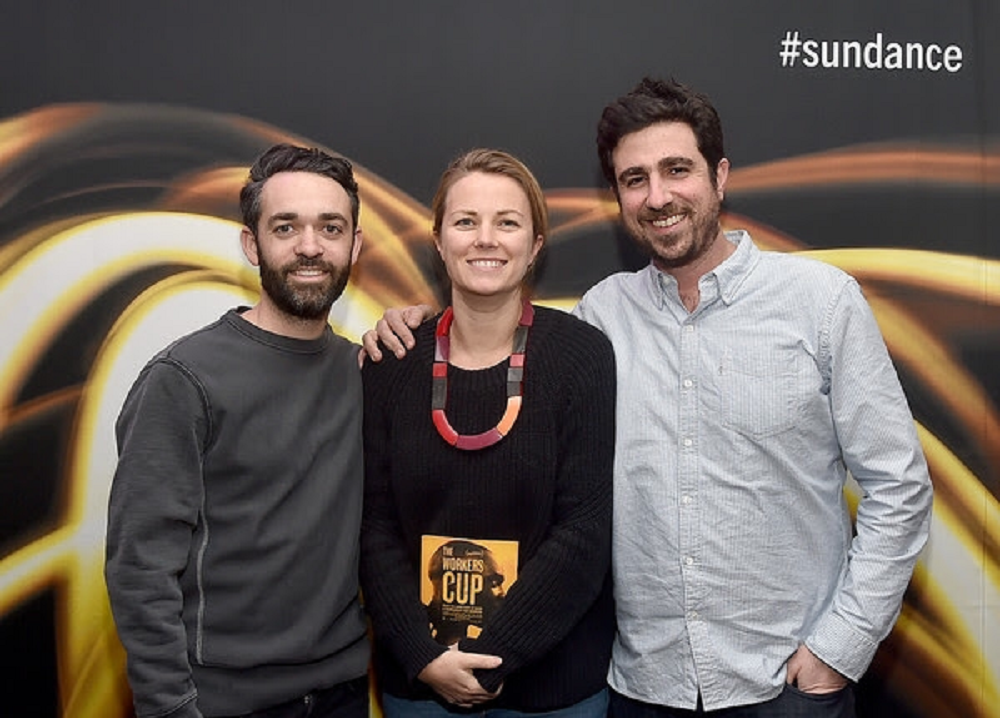Migrant workers around the world work in very dangerous conditions and live in even worst conditions. The Workers Cup is a documentary by director Adam Sobel which looks at the migrant workers and labourers who are working in Qatar building stadiums for the 2022 FIFA World Cup. The workers face death and injury on a daily basis but they are all united by their love of football. The Daily Vox team spoke to Ramzy Haddad, a producer of the film, about why they wanted to tell the workers’ story.
The film captures the experiences of the workers but it does a lot more than. Tell us what the film is actually about.
Qatar, as you know, is hosting the next World Cup in 2022. It’s a very big deal. Along with having a world-class event comes a lot of attention to countries as we saw with China when they hosted the Olympics or South Africa or a country that hosts a major event. There is always a lot of media attention. After the event was awarded to Qatar in 2012, a lot of attention was given to the treatment of migrant workers there. About 60% of Qatar’s population are migrant workers – blue-collar more specifically. Ninety percent of the population are foreigners. That could be your white-collar professors to the street cleaner and construction worker. This attention was long due and having an event like the World Cup meant there was a lot of attention on there was a lot of exploitation that was happening. There were construction sites with bad health and safety records. There basically needed to be an overhaul of the way blue-collar migrant workers were treated in Qatar. So there was a lot of international attention.
We had done a lot of coverage for international stations about this story […] as journalists based in Qatar. Our access was always limited. It’s not a story that the government really wants people to cover. There were a lot of challenges. We didn’t want to put anyone at risk so we were always careful when we covered the story. When we heard about the Workers Cup tournament which was a tournament organised for migrant workers who worked for companies that were bidding for the World Cup project, it felt like this opportunity to cover their situation in a way that was open with the access. This was a tournament that the organisers and the government wanted to promote. They wanted to show that they are treating their workers well by organising this tournament.
It was our chance to seize on this PR opportunity and cover this story and spend time with the workers in a meaningful way. We approached the organising committee and they gave us a reluctant okay to cover the tournament. We ended up following one of the teams for about a one year period. We followed their journey throughout the football tournament when they were playing against several companies. We got to know them personally: what brought them to Qatar, who did they leave behind, what were the challenges when they came here and what was their recruitment process like.
Our main character Kenneth was kind of duped. He was told he was coming to work for a construction company and then he would find a professional football team there. When he came he obviously realised he had been duped. He had paid $2500 to travel there and discovered he would just be a migrant worker where the laws of Qatar did not allow him to change jobs. Those kinds of stories we got to know through the lens of football.
Were the workers featured in the film in any risk (of losing their jobs or worst)?
This was a PR opportunity and Qatar wanted to have attention to the Workers Cup so we were given access. We went to into all of the places with the consent of the organising committee of the Workers Cup with the consent of the companies. They were aware that we were talking to the workers. I should highlight that the company we followed was one of the better ones in Qatar which shows you how low the standards are. They didn’t have many insecurities about us exposing something or there being anything scandalous. We had assurances that the workers would not face any backlash and none of them have fortunately. The company was not super excited about the film when we showed it to them. But one of their first comments was that nothing illegal happens in the film. They were quick to highlight that since we filmed there had been a few changes in the camp mainly that that there is a bus stop outside the camp so people could travel into the city and they could now use a laundry machine. In the film, you see, the guys cleaning their clothes by hand.
And the reaction from people who have seen the film?
I think people have – not to sound boastful – but people have really reacted very strongly to the film. It’s a film that the director Adam and the producers myself and Rosie wanted to make that spoke in the voice of the workers. There are no experts that comment. It is really their perspective. We tried to highlight something that sounds simple but their humanity. It is something that has been lacking with the workers. In the Western European and North American press, they are portrayed as simply victims without agency. In Qatar, they are seen as a resource. We wanted to show their humanity, their complexities, their sense of humour, their insecurities, their thoughts, and their heroics. That was a big thing for us to make the film from their perspective as much as we could.
What type of response did you want in terms of creating change for the workers?
As filmmakers, the best we can do is to tell a good story and from there hopefully change hearts and minds. Like I said a lot of the coverage of migrant workers in Qatar has just sometimes plainly attacked Qatar rightfully or wrongfully. We wanted something a little more nuanced. We wanted people to empathise, not just sympathise with them and to feel what they are experiencing. In the film they talk about relationships, they talk about the sacrifices made for family, hopes and dreams and how they can be dashed. These are universal things that people experience so we hoped to open a window into the lives of migrant workers not simply from a report like an Amnesty report.
That is very important but [the film wanted to do that in] a more nuanced way. By telling a story you can highlight things in a clearer way for people to appreciate and feel for the characters.
What did you hope to achieve through showing the film?
After releasing the film, we’ve done something called an impact/outreach campaign. We are trying to sensitise people to the lives of migrant workers. There is a lot of stuff about their living and working conditions but there is very little done about the emotional impacts of being the poorest people in the richest country in the world. Of leaving family behind, of living in a camp with 4000 other men. Of not having the opportunity to interact with women. Feeling marginalised and on the outside of society because it’s a very expensive country where they generally can’t afford to live the same experiences as the people around them.
We are doing that through educational packs that teachers can discuss in their classrooms. We are showing the film to stakeholders so we’ve shown it to companies, the government in Qatar, the organising committee, to FIFA’s human rights committee. We are showing it to people in positions of power who might benefit from a fresh perspective on migrant workers.
And how has FIFA responded?
They are surprised. They haven’t seen the migrant workers in that light. The big issue with Qatar is that you have several communities from different countries and there is a language barrier. We have characters from India, Bangladesh and Nepal. So having the translations and seeing the characters and hearing them speak has been enlightening for many people. How that actually leads to change is a long process. We are not delusional. We know it takes a lot of work. Organisations like Amnesty and Human Rights Watch have really taken the film on and shown to big decision-makers in the world of football to sensitise them to the situation in Qatar. We hope it will lead to some change but all we can do as filmmakers is try to change hearts and minds.
How big is the issue of the exploitation of migrant workers?
It’ll give you an example. There was an article recently about New York and worker deaths in New York City. Basically the construction sites where the most worker deaths took place were the ones which relied on vulnerable, illegal migrants. So whenever people are vulnerable and are susceptible to exploitation, these things will happen. Qatar definitely has a responsibility as the host country to the workers but it’s a global system. It happens with the recruiters that are hiring them from their countries, it happens with the companies that have investments in Qatar and their bases are in Europe, America or South Africa. It is a global system that unfortunately exploits people who are the most vulnerable and that can happen anywhere in the world. And because these are such big events that require such a mobilisation of workers and resources and money, they are more susceptible.
Who should be watching this film?
I think football is a beautiful sport. It brings out a lot of passion in people and I think that’s what people will see in the film. What football means to these guys. Their lives can be quite mundane and routine but for 90 minutes a week, they get to be heroes on the pitch and it’s that escape that they feel. I think it’s contagious when people watch the film and they really want the team to win. They get vested in their journeys throughout the tournament so if you’re a football fan definitely [watch it]. But if you’re not a football fan, it has insights into the lives of the migrant workers.
The story of migrant workers has not been covered extensively because of the difficulty of covering it so it’s kind of a window into a relatively closed world. People enjoy that and our characters are amazing. We were fortunate to find them. They are funny and passionate and I think that really comes across when people see the film.
If you are in the Johannesburg area, the film will be screened September 6 at the Roving Bantu Kitchen at 7:30 pm. More information on the event can be found here.
The interview was edited for clarity and brevity.









